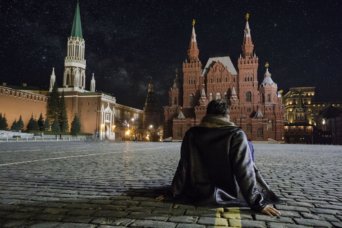- About
- Topics
- Story
- In-Depth
- Picks
- Opinion
- News
- Donate
- Signup for our newsletterOur Editors' Best Picks.Send
Read, Debate: Engage.
| topic: | Immigration |
|---|---|
| located: | Russia |
| editor: | Igor Serebryany |
Eighty-one per cent of Russians aged 14-29 polled by the Levada sociometric think tank believe they can hope for a prosperous future for themselves only outside of their home country. And only 43 per cent of those polled believe the future of Russia is bright.
Meanwhile, only seven per cent of the respondents admitted they personally are involved in activities that contribute to changing the state of affairs in the country. They believe no changes could be achieved by whatever means and emigration remains the only feasible option to improving their living conditions.
Among those who said they looked forward to emigrating, 75 per cent also admitted that emigration is only a sweet dream for them as they are not active in making that dream a reality.
Levada's director Lev Gudkov points out that the number of people who "love changing places" has been nearly the same in any society. According to the sociologist, that number hovers just above 10 per cent of the population. But the gapping distance between the respondents' dreams and reality is due to a Russian general aversion to moving elsewhere. This attitude is embedded into the Russian language with plenty of analogues of the English proverb "East or West. home is best."
Emigration is piggishness toward those who stay in the country, blogger Mikhail Pozharsky says bluntly. "Emigration removes those who could lead the fight against Russia's authoritarian state. Emigration justifies their compromise with their inner judge. They explain their participation in the corruption chains with the excuse to earn money for establishing themselves or their children abroad", he says.
On the other hand, some openly pro-Kremlin politicians speak in favour of emigration. For instance, a federal MP Vitaly Milionov believes that Russia will only be better off if half of its populations depart.
"Russia will lose nothing if the entire so-called creative class leaves. For me, a peasant who gets up at 5 in the morning to milk a cow, is a creative class because she produces something, while all those boys with their freaky haircuts do nothing but hitting their notebooks' keyboards all day long", he says.
Desire to "run away" has been strongest among young professionals, and this is completely understandable, historian Irina Ostroukh says. "In modern Russia, there are no social elevators. A young person here understands that be he or she as wise as Solomon, they will never make it to the social top unless they were born to the members of the elite. Russians believe that no one cares about your origin in the West and if you are smart you have your chance to grow professionally and socially within a relatively brief time range."
Even though not every emigrant wins a "golden ticket", staying in Russia means voluntary surrender to the circumstances beyond one's abilities, Ostoukh adds. There's a huge gap between "to want" and "can", director of the Political Sociology Institute Vyacheslav Smirnov agrees.
"Those who want something are always prevailing. Just ask a question, who wants to be a millionaire. In case of emigration, the situation is exactly like that: people estimate their real abilities to leave Russia whatever their 'sweet dreams' could be," he says.
Smirnov highlights that the number of Russians who want to emigrate has been strikingly close to the number of citizens in possession of travel passports. "About 80 per cent of adult Russians have never travelled far away from their home region, let alone the country. They don't speak foreign languages and, generally, are hardly interested in life outside their micro-society. Even those who say they would like to emigrate hypothetically often admit the game isn't worth the candle."
Smirnov adds that his institute once conducted a survey similar to the Levada's one. "When we asked people why they didn't make any attempts to emigrate, they were honest. People said they had preferred a miserable life in Russia to a prosperous one abroad because to reach prosperity in the West they will have to 'wake up at six and go to bed at midnight', while in Russia they earn five times as little but can work half-assedly," he recalls.
Image by NewLightStudio
